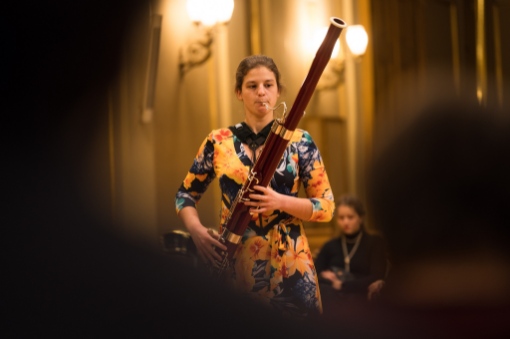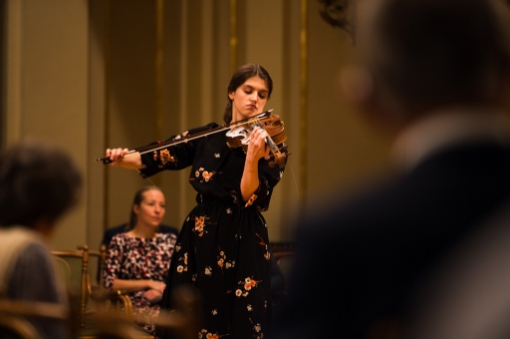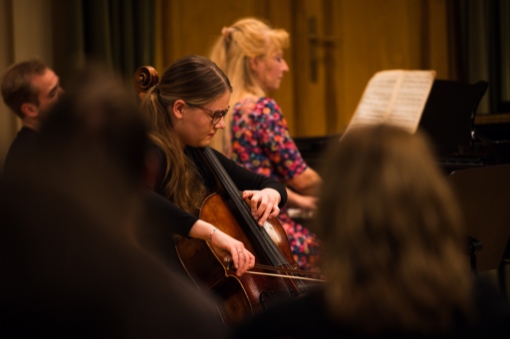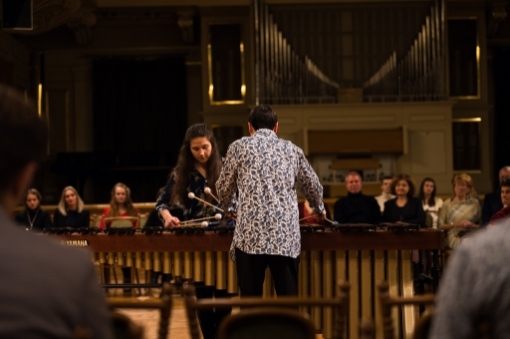The Brno Philharmonic Orchestra has been running the Orchestral Academy of the Brno Philharmonic (OAFB) project for nine seasons, enabling young talented musicians to gain orchestral experience in a professional ensemble. In this manner, the orchestra educates the next generation of musicians, both permanent and external. However, working here also gives young people the opportunity to show their skills in chamber music and in a concert series called Young Blood aka Music Up Close. The first seasonal concert took place on Wednesday 15 November at Besední dom.
The program began with Variations on Pergolesi’s Arietta for bassoon and piano by the Italian composer Otmar Nussia (1902-1990). The original version of the piece with string orchestra was written by the composer for the Geneva International Music Competition. Within the ten characteristic variations, however, the quotation of Pergolesi’s theme loses its original context under the weight of diverse stylizations and techniques. The composition mirrors and offers a short excursion into the world of bassoon playing. Soloist Teresa Bínová impressed with her delicate colourful register in the higher positions, easily confused with the sound of the alto saxophone. Jana Goliášová’s accompaniment, which at the beginning of the opening variation slightly drowned out the bassoon part, can be described as sensitive and tasteful in the context of the whole, at least thanks to the mutual listening by both players.

Violist Ariana Suleiman Shakh presented herself to the audience in Bohuslav Martinů’s (1890-1959) Rhapsody-Concerto with piano accompaniment by Libuše Pančochová. The two-movement composition with a more relaxed formal plan represents the composer’s so-called fantasy period. The first movement, Moderato, is built on a simple idyllic melody based on American traditionals. It is then followed by a rhythmically, accentually contrasting Molto adagio full of dramatic expression and gradation culminating in a viola cadenza. Suleiman Shakh’s calm ethereal delivery in the first movement was dominated by a soft cultured tone. In the contrasting second part of the piece, the violist showed her other - more energetic and predatory face, which she technically supported by more specific bowing (especially in the runs) and more pronounced accentuation. The performance was not without considerable intonational imperfections, which, however, can be described as negligible given the technically rich and demanding composition. Libuše Pančochová’s piano accompaniment - precise, technically excellent and well thought out in terms of expression - worked as an equal partner to the viola in many places - primarily in the interludes - as it does in the orchestral version.

Cellist Štěpánka Plocková dazzled with a sovereign performance comparable to that of any professional player. For this evening, she performed the first two movements of the Sonata for Cello and Piano Op. 36 by Edvard Grieg (1843-1907). The young musician’s performance had everything - cantabile lyrical melodies, technical sophistication, ingenious construction of musical ideas and the associated tightening of phrases. As a result, Štěpánka Plocková’s playing was not a mere musical performance, but an imaginary narrative. It was no different in the case of the piano, which was taken up by Renata Ardaševová, whose dynamic and agogic delivery added plasticity to the piece.

The last moments of the evening belonged to percussion - more precisely to the percussionists Anežka Nováková, Martin Kučík and Jakub Kub. The first two first appeared as a duo in the work Allegro barbaro by the Hungarian composer Béla Bartók (1881-1945), originally written for piano. The arrangement by Martin Opršál, who is also the leader of the JAMU Percussion Ensemble, in which the artists also perform, presents an instrumentation for marimba and two players. The staging of this version is remarkable in several respects. In terms of interpretation, it is necessary to play the piece at a slower tempo than in a piano performance, because of the interplay between the two players and the technical specifics of marimba playing. Although it was essentially a literal transcription, one could not help but notice a few moments in which Martin Opršál used other musical means (e.g., tremolo, trill, etc.) so that everything was preserved in terms of sound and musical material, while at the same time ensuring that the places corresponded to the aforementioned specifics of the instrument or its playing. The rough and direct nature of the accents, dynamic leaps, and above all the significant rhythm of the piece were not lacking, but these features were not as pronounced compared to the piano version. This is most likely due to the different acoustic properties of the instruments, which naturally result in a different sound pool. The version for marimba therefore seemed much more static in terms of pure listening, but not monotonous.
La Fiesta by jazz pianist and composer Chick Corea (1941-2021) is based on Spanish flamenco. The dance-like composition is based on a repeating a three-chord cadence, which is interrupted by moments of improvisational character during the composition. The work arranged by Rostislav Mikeška for vibraphone (Anežka Nováková), marimba (Martin Kučík), piano (Dominik Gál) and percussion ensemble (Jakub Kub) formed a certain musical relief at the end of the concert, which stood out for the precise delivery by the players, giving the composition the desired vibe. With this cherry on top, the young musicians said goodbye to the audience of Besední dům, who rightly rewarded the talents with immense applause and loud ovations.
Program:
OTMAR NUSSIO - Variations on Pergolesi’s Arietta for bassoon and piano
Teresa Bínová - bassoon, Jana Goliášová (guest) - piano
BOHUSLAV MARTINŮ - Rhapsody-Concerto for viola and orchestra (piano) H 337
Ariana Suleiman Shakh - viola, Libuše Pančochová (guest) - piano
EDVARD GRIEG - Sonata for Cello and Piano (selection)
Štěpánka Plocková - cello, Renata Ardaševová (guest) - piano
BÉLA BARTÓK / arr. Martin Opršál - Allegro barbaro BB 63, Sz. 49 for one marimba
Anežka Nováková, Martin Kučík – marimba
CHICK COREA / arr. Rostislav Mikeška - La Fiesta for vibraphone, marimba, piano and percussion
Anežka Nováková - vibraphone, Martin Kučík - marimba, Dominik Gál (guest) - piano, Jakub Kub (guest) - percussion instruments
Wednesday 15 November 2023 at 7 pm, Besední dům
































No comment added yet..